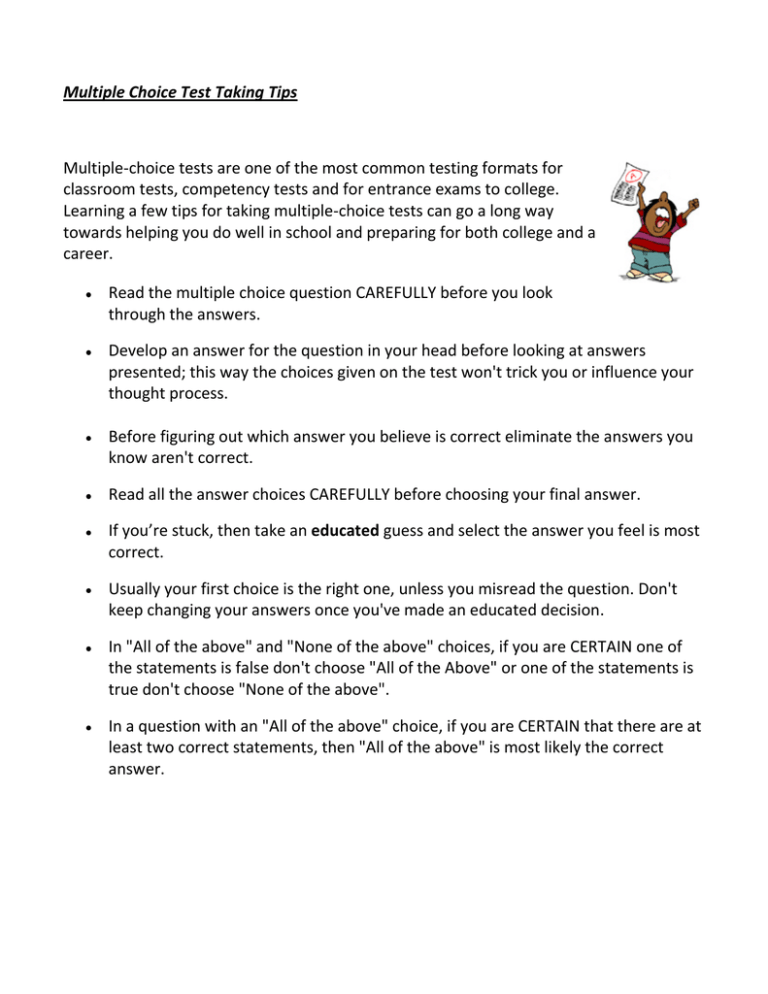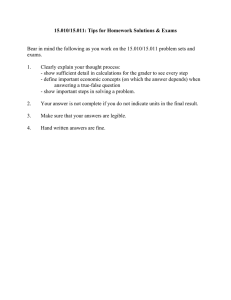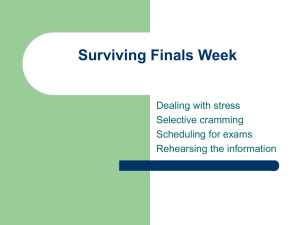Multiple Choice Test Taking Tips Multiple
advertisement

Multiple Choice Test Taking Tips Multiple-choice tests are one of the most common testing formats for classroom tests, competency tests and for entrance exams to college. Learning a few tips for taking multiple-choice tests can go a long way towards helping you do well in school and preparing for both college and a career. Read the multiple choice question CAREFULLY before you look through the answers. Develop an answer for the question in your head before looking at answers presented; this way the choices given on the test won't trick you or influence your thought process. Before figuring out which answer you believe is correct eliminate the answers you know aren't correct. Read all the answer choices CAREFULLY before choosing your final answer. If you’re stuck, then take an educated guess and select the answer you feel is most correct. Usually your first choice is the right one, unless you misread the question. Don't keep changing your answers once you've made an educated decision. In "All of the above" and "None of the above" choices, if you are CERTAIN one of the statements is false don't choose "All of the Above" or one of the statements is true don't choose "None of the above". In a question with an "All of the above" choice, if you are CERTAIN that there are at least two correct statements, then "All of the above" is most likely the correct answer. General Test Preparation Tips Prepare early. The sooner you start preparing for your first test the better you'll perform. You should begin preparation for your first test after the first day of class; this includes studying regularly, completing all your homework and reviewing study materials regularly. Manage time. Manage your time effectively. Make sure you allocate enough time to study so that you're well prepared what your test time comes. Get on top of things and stay on top. You must spend at least six hours every day studying. And that doesn't include the actual time you spend in lectures and in labs, or even the time you spend writing lab reports or completing assignments. Careful planning and good time management skills are essential. Set up a regular study schedule and stick with it. Don't be embarrassed to ask questions. You should ask your instructor to identify those areas of study that will be emphasized on the test. Your instructors are being paid to help you. Make them work for their money. They don't mind. Get help. If there are topics you just don't understand, and problems you just can't solve, then ask your professor and/or get a tutor. Don't wait until the day of the exam to get help! Review carefully. Get the big picture by reading lecture notes, handouts, problem sets, and laboratory questions and reports carefully and integrating all of these sources of information in your notes. - Take detailed notes and identify important concepts and topics. - Outline the main ideas, concepts, and information onto a sheet that can be easily reviewed many times. This will make it easy to remember key concepts as well as the information related to each concept. - Organizing the material will help you see connections and get the material into your long term memory. - But don't spend too much time simply making your integrated notes look good - there's little satisfaction in being the neatest C student in the class. Focus on objectives. If there are "Learning Objectives" on course handouts/textbooks/web pages/syllabi that tell you exactly what concepts you're expected to learn and what skills you must master, then use those. You may find lists of skills and keywords at the end of each chapter, as well. Use those lists as a pre-exam checklist. Don't bother cramming. It won't work. Cramming puts things into your short term memory- and if you're exhausted, it's very short term. You should study throughout the week before the exam, so that when the day to take the exam comes, you will feel confident of your preparation. Practice. You must do as many problems from the text, study guides, and notes as you can. The more practice you get, the richer your understanding of the underlying concepts becomes. Look at past exams. Examine old exams, from your course. These are indispensable study aids. They reveal the format of the test, and allow you to judge the scope of the material and the depth of coverage. You can even use the old exam to pinpoint your own strengths and weaknesses by taking the exam. Don't assume, however, that the old exam accurately reflects the actual content of your upcoming exam- it doesn't. It does give you a valuable glimpse at what your instructor thinks you should have studied before the test. Sleep well. Make sure to get at least 5 hours of sleep before you take any test. Don't pull an all-nighter. While this may seem like a good idea, you'll show up to your test tired and unfocused. Eat well. Being in good physical and mental condition is important to effective test preparation. Make sure to eat before taking a test -- you need the energy to help you focus. Don't eat junk food that will make you groggy. Arrive early. Arrive at class early the day of the test; this is a great time for your instructor to give some last minute hints, guidance or instruction that will help you perform better on the test. Always show up at least 5 minutes before the test starts. Eliminate distractions. Visit the restroom before you start your test. You don't want to waste valuable test time using the bathroom during the test. This is especially important if you're taking a timed test. Review exam. After getting your exam back, review all the questions. See which ones you answered correctly, and especially look at those you got wrong, and determine why they were incorrect.


